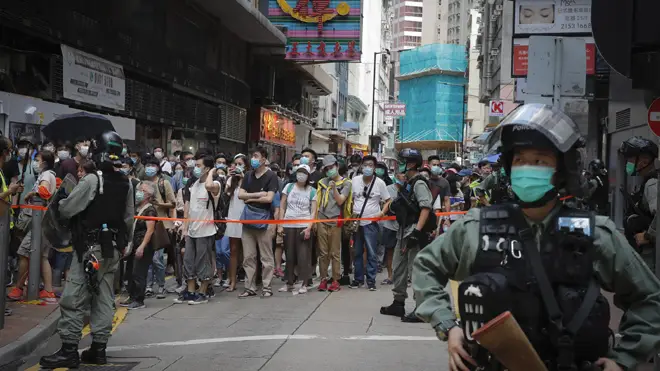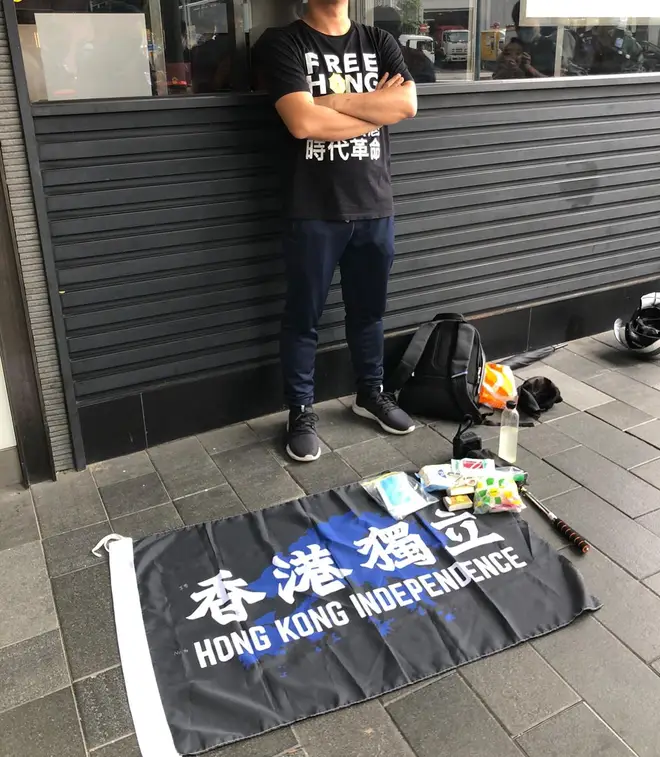
Ian Payne 4am - 7am
1 July 2020, 08:23

Boris Johnson has said he will introduce a new route for Hong Kong residents with the correct status to enter the UK following the introduction of a controversial new security law imposed by China.
People with British National (Overseas) status will be allowed limited leave to come to the UK and work after China imposed a law on the citizens of Hong Kong that effectively curtails their rights to call for independence.
The offer means roughly 350,000 Hong Kong residents with British overseas passports can come to the UK to live and work, putting them on a path to citizenship. A further 2.5m people would be eligible to apply.
It comes after Foreign Secretary Dominic Raab has said a new 'national security' law imposed by China "constitutes a clear violation" of the autonomy of Hong Kong.
Speaking to reporters outside the Foreign and Commonwealth Office on Wednesday, Mr Raab said: "We have very carefully now assessed the contents of this national security legislation since it was published last night.
"It constitutes a clear violation of the autonomy of Hong Kong and a direct threat to the freedoms of its people, and therefore I'm afraid to say it is a clear and serious violation of the joint declaration - the treaty between the United Kingdom and China."
Police in Hong Kong made the first arrests of independence protesters under the new legislation today.
The new law came into effect at 11pm on Tuesday and was brought in by the mainland following anti-Government protests last year.
Officers arrested one man during a protest at the Causeway Bay shopping district on suspicion of being in violation of the new law, according to a police statement on Twitter.

The demonstrator was said to be carrying a pro-independence flag, an activity banned under the new law which forbids taking part in secessionist activities, such as shouting slogans or holding up banners and flags calling for independence.
#NationalSecurityLaw in effect. #HKPolice further arrested a female for showing a material with #HKIndependence slogan in #CausewayBay, Hong Kong. #HKPolice will take resolute enforcement action in accordance with #NSL. pic.twitter.com/mTmJWt8Z8m
— Hong Kong Police Force (@hkpoliceforce) July 1, 2020
Police also said a woman holding a small placard calling for Hong Kong's independence was also arrested.
Police later said they had made 30 arrests and water cannon were being deployed to disperse protesters.
#BREAKING: A man was arrested for holding a #HKIndependence flag in #CausewayBay, Hong Kong, violating the #NationalSecurityLaw. This is the first arrest made since the law has come into force. pic.twitter.com/C0ezm3SGDm
— Hong Kong Police Force (@hkpoliceforce) July 1, 2020
The most serious offenders, such as those deemed to be organising the crimes, could receive a maximum punishment of life imprisonment. Lesser offenders could receive jail terms of up to three years, short-term detention or restriction.

Hong Kong demonstrators protest controversial new security law
Hong Kong's leader strongly endorsed the new law in her speech marking Wednesday's 23rd anniversary of the territory's handover from colonial Britain.
"This decision was necessary and timely to maintain Hong Kong's stability," Carrie Lam said following a flag-raising ceremony and the playing of China's national anthem.
A pro-democracy political party, the League of Social Democrats, organised a protest march during the flag-raising ceremony. About a dozen participants chanted slogans echoing demands from protesters last year for political reform and an investigation into accusation of police abuse.

Iain Dale forensically challenges caller who says China are "right to take back Hong Kong"
The law further blurs the distinction between the legal systems of semi-autonomous Hong Kong, which maintained aspects of British law after the 1997 handover, and the mainland's authoritarian Communist Party system.
Critics say it effectively ends the "one country, two systems" framework under which Hong Kong was promised a high degree of autonomy.
By raising the new purple warning flag, #HKPolice warned #HKProtestors chanting #HKIndependence slogans that they may have breached #NationalSecurityLaw in #CausewayBay, Hong Kong. pic.twitter.com/xwcSjHL7dO
— Hong Kong Police Force (@hkpoliceforce) July 1, 2020
The law directly targets some of the actions of anti-government protesters last year, which included attacks on government offices and police stations, damage to subway stations, and the shutdown of the city's international airport.
Acts of vandalism against government facilities or public transit can be prosecuted as subversion or terrorism, while anyone taking part in activities deemed as secessionist would also be in violation of the new law.
Hong Kong's police had issued a statement saying they would consider as illegal any flag or banner raised by protesters deemed to be promoting Hong Kong's separation from China or expressing support for independence for Tibet, Xinjiang and the self-governing island democracy of Taiwan that China claims as its own.
Concerns have also been raised over the fate of key opposition figures, some of whom have already been charged for taking part in protests, as well as the disqualification of candidates for the Legislative Council elections scheduled for September.
Schools, social groups, media outlets, websites and others will be monitored and their national security status will be raised, according to the law's text, while Beijing will have authority over the activities of foreign non-governmental organisations and media outlets in Hong Kong.
The legislation was mandated under Hong Kong's local constitution but an earlier attempt to pass it in the city's legislative body in 2003 was shelved in the face of massive public opposition.
Having lost patience, Beijing finally decided to circumvent the Hong Kong legislature and have it passed on Tuesday by the Standing Committee of the National People's Congress, China's rubber-stamp parliament.
President Xi Jinping signed a presidential order putting the law into effect and it has been added to the Basic Law, Hong Kong's constitution.